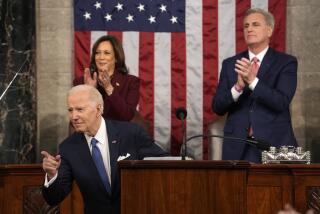Nationalism Should Accent the Positive
- Share via
With Congress’ recent rejection of the nuclear test ban treaty and an upcoming World Trade Organization meeting that’s already causing a storm, it’s useful to remind ourselves that there are two faces of nationalism--one negative, one positive. The negative face turns away from global responsibilities. The positive one embraces domestic ones.
Both give priority to “us” over “them.” Both believe that the United States should come first. Both depend for their force on a nation’s sense of common purpose. But negative nationalism uses that commonality to exclude those who don’t share it. Positive nationalism uses it to expand opportunities for those who do.
Negative nationalism assumes that the world is a game where our gains come at another nation’s expense, and theirs come at ours. Positive nationalism assumes that when our people are better off, they’re more willing and better able to add to the world’s well-being.
These are the two real political parties in the United States. You’ll find both positive and negative nationalists among Republicans as well as among Democrats. George W. Bush’s “compassionate conservatism”--still conveniently undefined--at least urges Americans to be generous toward other Americans. The Republican right, meanwhile, is determined to turn America’s back on the rest of the world. Democratic primary challengers Bill Bradley and Al Gore are engaged in a long-overdue debate about how best to meet the needs of the poor and near-poor in the U.S., even as Democrats are putting priority on fighting a new round of world trade agreements.
History teaches that one of the two faces of nationalism almost always predominates. A society with a lot of positive nationalism is more likely to be tolerant and open toward the rest of the world because its people have learned the habits of good citizenship and social justice. Dictators and demagogues, on the other hand, flourish where social capital is in short supply. People who feel little responsibility toward one another will turn against minorities in their midst and outsiders across their borders in return for promises of glory or comforting fictions of superiority.
Negative nationalists prey most directly on people who are losing ground economically and socially. The recent resurgence of negative nationalism in Austria, France and Switzerland is especially evident among blue-collar manufacturing workers and young men who feel the economic ground shifting out underneath them. The ugly violence against ethnic Chinese in Indonesia during the currency crisis there was also rooted in economic fears. People whose livelihoods are at risk find it reassuring to be given specific targets for their frustrations. Among economic insecurity’s first scapegoats are always immigrants, foreigners and ethnic minorities.
A healthy dose of positive nationalism can ease these sorts of anxieties by softening the burdens of economic change. When they feel especially connected to their compatriots, citizens who gain from change are more willing to support the kinds of strong safety nets, employment programs and educational systems that help ease the burden on those who otherwise would fall far behind. And the generosity of the winners in turn allows the nation as a whole to better accept the consequences of free trade, open capital markets and more liberal immigration. Failure to choose positive nationalism almost surely promotes its negative twin, because the losers are left vulnerable.
Nations now busily shredding their safety nets and slashing their social spending may believe that they’re moving toward free markets, and in a narrow economic sense, they are. However, in the process, they risk breaking the bonds of positive nationalism and exposing their people to the very fears and uncertainties upon which negative nationalism feeds. The inadvertent consequence may be a backlash against not only free markets but also political freedom.
Those who believe that membership in a society obligates the successful to help those who are falling behind should not recoil from appeals to nationalism. The moral force of social benevolence rests, after all, on the preexistence of strong bonds among a people who share common values and aspirations. Nationalism is not the danger. The real danger comes in allowing the negative nationalists to claim the mantle of patriotism for their own ends.


